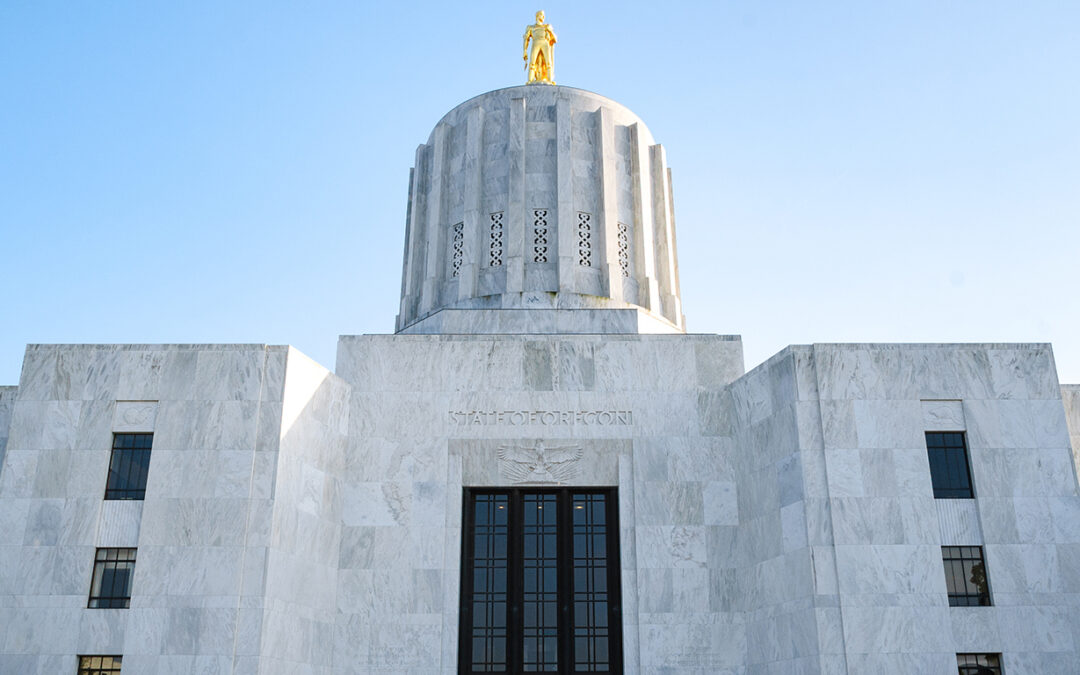
Jan 27, 2025 | AOC Advocacy
The 83rd Oregon Legislative Assembly convened on Tuesday, Jan. 21, to begin the 160-day session. The Association of Oregon Counties (AOC) Legislative Affairs Department had a productive first week in the Capitol meeting with legislators, attending hearings, and networking with our colleagues. We are already well on our way to achieving our team’s goal of meeting with all 90 legislators in the first 30 days of session to introduce the AOC team and our 2025 policy priorities.
AOC members are encouraged to engage in AOC’s policy process this session – our advocacy is strongest when it is informed by our counties across the state. If you’re not already receiving steering committee meeting notices and agendas, you can sign up through the 2025 AOC Committee Interest Form. AOC steering committee meetings are a critical forum for our members to learn about and weigh in on legislative concepts impacting county services, budgets, and governance.
The AOC Legislative Committee meets in Salem at the AOC office on the second Monday of every month – “AOC Day” – to consider steering committee recommendations. AOC steering committees meet on a rotating schedule the preceding Friday (virtual only) and Monday (hybrid). The most up-to-date information can be found on the calendar on AOC’s website, and calendar invitations are sent out monthly.
Members can also expect emailed communications from AOC’s Legislative Affairs Department with timely legislative updates, information about action taken by the AOC Legislative Committee, and issue-specific action alerts urging our members to contact legislators or submit testimony on high priority bills.
The AOC Legislative Committee adopted the below 2025 Policy Priorities based on steering committee recommendations in June 2024. These priorities, along with positions and principles recommended throughout the legislative session by AOC steering committees, guide the advocacy work of the AOC Legislative Affairs Department.
AOC 2025 POLICY PRIORITIES
Assessment and Taxation Funding
- Sustain and protect the property tax asset to the benefit of all property owners and taxing districts through adequate, equitable, and stable funding for county assessment and taxation programs.
Contact: Legislative Affairs Manager Justin Low, Governance, Revenue, and Economic Development
Health and Human Services
- Provide counties with the resources to address Oregon’s addiction and homelessness crises by removing administrative burdens and funding county public health and behavioral health services, deflection programs, and local homelessness response coordination for youth and adults.
Contact: Legislative Affairs Manager Jessica Pratt, Health and Human Services
Natural Resources
- Protect and strengthen county authority, funding, and flexibility in managing local natural resource policies.
Contact: Legislative Affairs Manager Branden Pursinger, Natural Resources and Land Use
Community Corrections
- Fully fund a revised community corrections formula that accurately reflects the costs incurred by counties.
Contact: Legislative Affairs Manager Tim Dooley, Public Safety, Broadband, and Solid Waste
Transportation Funding
- Ensure a comprehensive transportation funding package prioritizes investments in operations, maintenance, and safety; incorporates diverse and modern funding mechanisms to ensure the growth and stabilization of the State Highway Fund (SHF); maintains the 30% county share of SHF revenues; and reduces barriers to local revenue sources.
Contact: Legislative Affairs Director Mallorie Roberts, Transportation
Contributed by: Mallorie Roberts | Legislative Affairs Director

Dec 17, 2024 | AOC Advocacy, Natural Resources
The 82nd Legislative Assembly officially convened for a special session on wildfire funding on Dec. 12, called by Gov. Kotek on Nov. 26, to allocate roughly $218 million to the Oregon Department of Forestry (ODF) and the Oregon State Fire Marshal (OSFM) to cover all pending expenses and outstanding bills from the 2024 wildfire season. By 3 p.m., the sole funding bill, Senate Bill 5801, had passed out of the Joint Special Session Committee on Wildfire Funding and was headed to the Senate and House for final passage. SB 5801 passed the Senate 25-2 and the House 41-2. By noon on Friday, Dec.13, the bill was signed by Gov. Kotek and the funds were being directed to ODF and OSFM.
The Association of Oregon Counties (AOC) testified in support of SB 5801. Without the passage of SB 5801 and the necessary finances to cover these costs, Oregon would have run the risk of not having the workforce or the vendors to fight fires during future wildfire seasons. The $191.5 million allocated to ODF will be used to pay 2024 gross large fire costs and ensure the agency is able to distribute roughly $17 million in timber sales revenue to counties and local taxing districts in 2024. The $26.6 million allocated to OSFM addresses cash flow concerns and reconciles the state’s obligations from this past fire season.
“This special session was an opportunity to receive funding for the 2024 wildfire season, however it was much more,” said Oregon State Fire Marshal Mariana Ruiz-Temple. “It sparked the conversation from partners and our legislators that Oregon needs a modernized wildfire funding methodology ─ one that focuses on the prevention and mitigation on the front end and adequate suppression. I am hopeful that as we move into session this work will continue to gain momentum and finally find solutions that meet the wildfire crisis and the conditions on the ground where they are at. Thank you to all our partners for their support.”
Between 2010 and 2019, the 10-year average of acres burned increased from 100,000 acres to roughly 500,000 acres annually. In 2020, over 1 million acres were burned and in 2024 that number reached 2 million acres. Since 2010, the total area in Oregon that has burned is equivalent to the combined land mass of Massachusetts and New Jersey.
Oregon’s gross wildfire costs averaged around $11 million per year from 2002 to 2012. From 2014 to 2024 these costs surged to an average of $75.5 million annually. The 2020 and 2021 calendar years exceeded $120 million, and the wildfire response costs alone in October of 2024 were $250 million and were continuing to climb. The full financial impact of the 2024 wildfires on the state is $352 million ─ $212 million higher than the previous record set in the 2020 Labor Day fires. However, the complete financial impact, when costs to local governments are fully factored, is not yet known but is expected to total well over half a billion dollars.
AOC will continue to advocate in the 2025 session for a long-term funding mechanism to support state and local government wildfire mitigation and response efforts.
Contributed by: Branden Pursinger | Legislative Affairs Manager

Dec 17, 2024 | AOC Advocacy
The 82nd Oregon Legislative Assembly met Dec. 10-12, in Salem, for its final interim Legislative Days committee hearings as well as a special session, called by Governor Kotek to appropriate funds to the Oregon Department of Forestry and the Oregon State Fire Marshal to cover costs related to the 1.9 million acres burned by wildfires across the state this year.
The 83rd Oregon Legislative Assembly will convene for a 160-day session on Tuesday, Jan. 21. View the 2025 Legislative Assembly Calendar here.
The Association of Oregon Counties (AOC) Legislative Affairs department actively participated in and monitored hearings, and used the opportunity to connect with legislators while they were in Salem, particularly around AOC’s 2025 Session Priorities. Below are links and highlights from the hearings with relevance to county governance, services, and budgets.
Joint Committee on Transportation
The Joint Committee on Transportation’s informational meeting included a Highway Cost Allocation Study (HCAS) three-biennia look-back and progress report from the State Economist, the Legislative Revenue Office (LRO), and Oregon State University. A new HCAS is due to the legislature in January and will inform 2025 transportation package development. Among introduced committee bill drafts, which are mostly placeholders, is LC 735, requested by AOC and the Oregon Association of County Engineers and Surveyors (OACES). Created as a pilot program by the legislature in 2019, LC 735 makes permanent the County Safety Corridor Program.
House Committee on Climate, Energy, and Environment
The committee under the new leadership of Representative Lively (D-Springfield) met for a series of informational hearings on Dec. 11. The committee heard a presentation from the Department of Energy and participants of the Community Resiliency Program. The committee then turned to an update from the Department of Land Conservation and Development (DLCD) and the City of Salem on the Climate-Friendly and Equitable Communities program. Finally, the committee heard two presentations on Small Modular Nuclear Reactors and a progress report on the Wildfire Funding Workgroup being run by the Oregon Department of Forestry and the Oregon State Fire Marshal.
Senate Committee on Natural Resources and Wildfire
The committee heard a presentation by House Agriculture Committee Co-Chairs Representative Helm (D-Beaverton) and Representative Owens (R-Crane) on their 2025 Water Policy and Investment Legislation package.
Senate Committee on Energy and Environment
The committee received an update from Representative Gamba (D-Milwaukie) on his Transmission Work Group, as well as presentations on Clean Energy, Regional Power Planning, and the Climate Protection Program (CPP) at the Oregon Department of Environmental Quality (DEQ).
House Committee on Agriculture, Land Use, Natural Resources, and Water
The committee heard a presentation on both the location and impacts Quagga Mussels and Emerald Ash Borer are having in the environment. If you are aware of these invasive species in your counties, Oregon’s Invasive Species Council maintains a reporting hotline. The committee also heard from state agencies and the Oregon Association of Clean Water Agencies on Water Reuse, and an update on the investments the legislature has been making in water since 2021.
Senate Committee on Veterans, Emergency Management, and Federal and World Affairs
The committee heard an informational presentation from the Oregon Department of Veterans Affairs, which highlighted how investments in county Veteran Service Organizations (VSOs) and veteran outreach have resulted in a doubling of federal VA benefit dollars coming into Oregon to nearly $4 billion annually. The Department of Emergency Management also presented a year in review, and emphasized their “Be 2 Weeks Ready” plan for individuals to prepare for disasters.
House Committee on Emergency Management, General Government, and Veterans
The Oregon Department of Forestry and the State Fire Marshal presented an overview of the 2024 fire season and emphasized the importance of their preparedness initiatives to pre-position equipment and reduce the likelihood of fires turning into conflagrations. The committee also heard testimony from Rangeland Fire Protection Associations about their role in responding to fires and how much they are able to do with very little financial support
House Interim Committee on Behavioral Health and Health Care
The committee heard a number of task force updates including behavioral health worker safety, alcohol pricing and addiction services, and the behavioral health workforce study (recommendations forthcoming). The committee also adopted 24 committee measures, including LC 2736 which would require Coordinated Care Organizations (CCOs) to include, when possible, a county commissioner and a local public health official on their governing boards.
Senate and House Interim Committees on Housing and Development
The committees adopted placeholder committee measures and received an update from the Representative Marsh/Governor’s Sustainable Shelter Work Group.
House Interim Committee on Revenue
The committee began with the introduction of 28 committee bills including one to address AOC’s legislative priority related to assessment and taxation funding, giving the policy a guaranteed legislative vehicle for staff to work at the start of the 2025 legislative session. Other bill requests of note were three legislative concepts addressing AOC’s 2024 priority around foreclosure sale surpluses, concepts relating to income and property taxes, and other maintenance or placeholder bills. Committee members also heard from the LRO who presented informational meetings on the income tax credit report, property tax exemption report, Oregon pass-through entity tax rates, and a timber tax review.
Joint Interim Committee on Judiciary
The joint committees for the House and Senate heard several informational presentations, including from the Specialty Court Task Force who presented the results of their findings, and found that those who participated in treatment courts were substantially less likely to recidivate compared to those who went through a traditional court system. There was discussion for multi-circuit specialty courts to allow smaller counties to provide treatment court services. Legislative concepts were introduced, including AOC’s public safety priority for district attorney discovery fees, which was introduced as a committee bill in both the House and Senate Judiciary Committees.
The Criminal Justice Commission (CJC) provided an update on crime trends within the state. Oregon continues to have fewer violent crimes per capita than the national average, and more property crimes, though property crimes have trended down for the last decade.
Joint Committee on Addiction and Community Safety Response
Deflection was the name of the game in the joint committee’s hearing. The CJC presented an update on cases moving through the court system and deflection itself. Out of 442 individuals who entered deflection, 10 have successfully completed the program so far. Each county has differing criteria and timelines for success, so as the program matures, we will get better data. The committee also heard from several district attorneys about their challenges and successes in launching deflection programs. They were unified in their request for additional funding to enable continued success of the program, as well as maintaining flexibility for counties to set their own priorities. Lane County, for example, is allocating $400,000 of their deflection funds for short-term housing for participants.
Legislative concepts were introduced, including a bill that would allow county-run community corrections facilities to be eligible for drug treatment programs restricted to “jails,” such as Jail-Based Medications for Opioid Use Disorder (JMOUD).
Contributed by: Mallorie Roberts | Legislative Affairs Director

Oct 30, 2024 | AOC Advocacy, Transportation
Until the passage of Senate Bill 1566 during the 2024 short session, Oregon law prohibited counties from charging fees for permits issued to water, gas, electric, and communications utilities for construction, repair, or maintenance work in the county right of way. The statutory preemption on permit fees meant that precious State Highway Fund dollars intended for county road improvements and maintenance were instead subsidizing public and private utility operations.
SB 1566 removed the preemption and allows counties to charge cost-recovery fees for permits issued to the utilities that could previously operate in the county right of way free of charge. This month, Multnomah County became the first to pass an ordinance to implement the bill and begin to recover the costs incurred by utility permit review and administration.
Multnomah County’s ordinance updates Multnomah County Code Chapter 29 Building Regulations to include a code section § 29.503(E) which states that the Director can set fees consistent with SB 1566 (2024). While this is a small change to the code, it effectively removes the preemption against charging utilities. Now that the preemption is removed Multnomah County can apply the fee structure it already has in place. SB 1566 allows Counties to charge on Jan. 1, 2025. However, Multnomah County plans to begin charging permit fees on July 1, 2025. Between now and then the Transportation Development program (which is responsible for permitting) will be updating their permit forms, doing some outreach to the utility companies and their contractors, and updating the online permit portal to make it easier for utility companies and their contractors to both apply and pay the fee.
Negotiated language in SB 1566 includes a fee cap, permit fee exemptions for vegetation management, routine maintenance, and emergencies, and requires that completed fee-eligible permits must be approved or denied by the county within 15 business days. SB 1566 sunsets in 2031, so the legislature will have to review and renew the authority it provides to counties in a future session.
SB 1566 contains language that allows a county to begin ordinance development now, with operative date no earlier than Jan. 1, 2025. The Association of Oregon Counties (AOC) encourages county boards of commissioners and county courts to work with county road departments and county counsels, and consider adopting an ordinance.
Submitted by: Mallorie Roberts | Legislative Affairs Director

Oct 28, 2024 | AOC Advocacy
The Oregon Broadband Office (OBO) recently announced the American Rescue Plan Act Broadband Deployment Funding Program (ARPA BDP) results. Through this program, 19 counties are receiving new broadband services. OBO selected 21 applications to receive the $157 million that Oregon was allocated. In total, 15,488 locations across the state will be served by broadband services, 86.5% of which are locations previously unserved. The average cost per household was $9,368. The average monthly service cost will be $39.04, with no program charging more than $50 per month.
The Broadband Equity, Access, and Deployment (BEAD) Program is coming up quickly. This program is going to be much larger than BDP, with total funding of $688 million. OBO is holding open office hours on the first Tuesday of the month at 10 a.m. Past recordings are on the BEAD website and you may register for upcoming meetings here. Please encourage your local providers to apply for this program and engage in proactive communication with OBO about pre-qualification and their application to resolve any issues to prevent the application from being disqualified.
Submitted by: Tim Dooley | AOC Legislative Affairs Manager

Sep 30, 2024 | AOC Advocacy
The Oregon State Legislature met Sept. 23-25, in Salem, for interim Legislative Days committee hearings. Below are links and highlights from the hearings with particular relevance to county governance, services, and budgets. As always, your AOC Legislative Affairs department actively participated in and monitored hearings, and used the opportunity to connect with legislators, particularly around AOC’s 2025 Session Priorities while they were in Salem.
The legislature will convene for one additional set of Legislative Days before the 2025 regular session — Dec.10-12. View the 2024 Legislative Assembly Interim Calendar here.
Joint Committee on Transportation
House Interim Committee On Revenue
Chair Nathanson directed committee staff to present an update on the twenty-eight (28) bills the committee would be introducing this 2025 legislative session. Notably, three (3) legislative concepts were introduced that are of significant impact to Oregon counties:
- One (1) bill addressing CAFFA funding changes, and;
- Two (2) bills for property tax foreclosures- one that will be systems focused and one that will address additional hopes expressed by the HB 4056 (2024) workgroup.
AOC’s Legislative Affairs department is confident in their next steps having a confirmed vehicle for the governance and revenue steering committee legislative priority- stable and sustainable funding for assessment and taxation.
Senate Interim Committee on Energy and Environment
- Recycling Modernization Act Update
- Work continues to develop curbside recycling programs and a uniform list of recyclable materials statewide. The program coordinator anticipates between $226-292 million will be available for communities to implement the program in the first year, but will have updated figures at the December committee meeting.
- Program is still on target to launch July 1, 2025 with funding beginning that date and fees to producers beginning. Initial fees are being set by type of material now.
Joint Interim Committee on Addiction and Community Safety Response
- Deflection Grant Rollout Overview – CJC Presentation
- HB 4002 Technical Fix Requests
- CJC gave a presentation on the beginning weeks of the deflection program response and noted that it was perhaps too early to draw any conclusions, though the early numbers of arrests for PCS-U were coming near the levels seen pre-COVID and ballot measure 110. Of the $18.4 million in county grant funding, 50% has been allocated to treatment, housing, or other support, while only 14% is earmarked for delivering deflection on the ground through law enforcement or district attorney offices.
- There was some discussion in the committee about the greater need for treatment services availability and the desire to clarify what a deflection program should look like versus one that is diversion.
Senate Committee on Natural Resources and Wildfire
A few presentations were provided to the members of this committee focusing on legislation to come in 2025.
- Oregon Department of Forestry, Office of the State Fire Marshal and Governor’s Office gave a presentation on the Wildfire Funding Work Group meetings which have been meeting monthly since June. The presentation focused on four key concepts for funding: Existing Funding Structures, General Fund Appropriation, New Sources of Revenue, and Changes to existing programs.
- Oregon Forest Industries Council and the Wild Salmon Center presented on the work that has been done on the Private Forest Accords and the need for continued funding in future sessions.
House Committee on Agriculture, Land Use, Natural Resources and Water
Committee members heard many presentations on issues the committee will look into during the ‘25 session.
- In addition to a similar presentation on the Private Forest Accords by OFIC and Wild Salmon Center, the committee had a robust discussion on PFAS (Polyfluoroalkyl Substances). The committee has taken an interest in this issue and will most likely consider legislation to tackle the problem.
- The committee had a discussion on the impacts climate change is having on Agricultural Producers from OSU. This presentation will serve as a ‘tee up’ for the next session’s drought package and potential work around Oregon’s Heat Dome and weather issues.
House Committee on Climate, Energy, and Environment
With a focus on the need to achieve the renewable energy generation by 2040 the Legislature enacted in 2021, the committee heard many presentations around Energy Siting and Energy Demands. The Committee is set to consider legislation in the next session focused on Grid-Enhancing Technologies (GETs) as well as ways to make Transmission Lines easier to permit and site in Oregon.
House and Senate Committees on Judiciary Joint Meeting
The House and Senate committees met together to hear updates on several items, including civil commitment reform updates from Oregon Judicial Department and from NAMI Oregon who has a bill in process for 2025 to lower the bar for civil commitment eligibility.
House Committee on Housing and Homelessness
The committee heard updates on the sustainable shelter funding workgroup led by Rep Marsh and the Governor’s office (on which representatives from Lane, Umatilla and Washington counties sit) and on the impending loss of affordable housing units.
House Committee on Behavioral Health and Health Care
Over two days of hearings, the committee first heard updates from state licensing boards on their progress to improve customer service and expedite applications as well as their thoughts on entering into interstate compacts to speed recruitment of out of state health professionals. On day two, the committee received an update from OHA on implementation of the recently approved Medicaid in carceral setting benefit and updates from the Alcohol & Drug Policy Commission and System of Care Advisory Council.
Contributed by: Mallorie Roberts | Legislative Affairs Director






